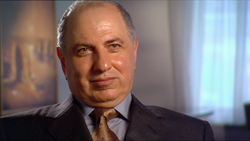
Jim Lobe, 11 July 2003, InterPress Service
"It is fairly incredible that the civilians in the Pentagon inhaled their own propaganda about the welcome that U.S. forces would receive from the Iraqis," said retired ambassador Chas Freeman, president of the Middle East Policy Council, a group of former U.S. officials and analysts who specialize in the region. "No one who knew anything about the region ever bought the notion that U.S. troops would be welcomed as liberators, but no one who knew anything about the region was invited to take part in policy discussions." The result, however, is that the ideologues, particularly those clustered around Cheney and Rumsfeld, simply reinforced each other's assumptions and attacked everyone, including the real experts, who disagreed with them.
The professionals were seen by the hawks as apologists for Arab dictators, Israel-haters, Saudi-lovers, shills for Big Oil, intellectually incurious, and slaves to traditional thinking. As Rumsfeld once complained about U.S. intelligence, "We tend to hear what we expect to hear, whether it's bad or good. Human nature is that way. Unless something is jarring, you tend to stay on your track and get it reinforced rather than recalibrated." So certain was Rumsfeld that the professionals were wrong, that he set up his own shop to "recalibrate" the intelligence, staffing it with people hand-picked by and ideologically compatible with Wolfowitz. At the same time, Cheney and his deputy, I. Scooter Libby, made frequent visits to CIA headquarters in what was taken as an effort to intimidate the analysts (and presumably CIA director George Tenet). It never occurred to the hawks, of course, that they might be as susceptible to human nature's failings as the professionals.
When the professionals argued in the administration's inner councils that U.S. troops would face as much apprehension and hostility as gratitude from key sectors of the Iraqi population, the hawks replied that they underestimated the attraction and political skills of a man like Ahmed Chalabi, the head of the Pentagon-backed Iraqi National Congress (INC), who told them of his far-reaching secret network of informants and supporters inside Iraq. Indeed, it was "defectors" who were "recruited" by the INC who provided the information that made the ideologues so confident about the existence of WMD, the ties between Baghdad and al Qaeda, and the rapturous greeting U.S. soldiers would get in Baghdad and on the way there.
"Why was the Pentagon so unprepared for the Day After?" asked Trudy Rubin, foreign affairs analyst for The Philadelphia Inquirer. "Back in November," she wrote last week, "Wolfowitz told me he believed that the London-based Iraqi opposition (headed by Ahmed Chalabi) would return to Baghdad and assume the reins of power, just as Gen. Charles de Gaulle and the Free French returned triumphantly to postwar France."
The hawks thus saw westernized Chalabi, who had not been in Baghdad since he was a teenager, as the man of destiny whom U.S. military forces had merely to install in the capital. The professionals, who had worked with him in the early 1990s, on the other hand, saw him as a confidence man.
full article






